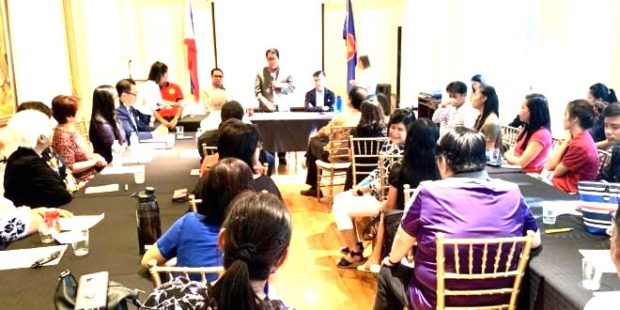PH, US officials trying to plug J-1 visa loopholes to stop abuse

Exploited J-1 visa exchange workers and their supporters convene in Washington, DC. MANILA MAIL
WASHINGTON D.C. — The Philippines and United States are finalizing new guidelines to curb J-1 (cultural exchange) visa abuse, including plugging regulatory loopholes, an official at the Philippine Embassy revealed last week.
Vice Consul Darell Ann R. Artates, head of the public diplomacy section at the Embassy, said they’ve “received and acted on complaints from Filipino J-1 visa holders most of whom are interns, teachers and participants in the Summer Work Travel category” of the US exchange visitor program (EVP).
“A Joint Working Group on J-1 concerns composed of officials of the Philippine Embassy and the U.S. Dept. of State are regularly meeting to exchange updates” and follow through on previous agreements, disclosed Artates.
About half a dozen Filipino J-1 visa holders have complained that “sponsors” in Maryland and North Dakota allegedly treated them like regular employees, paying them less than what’s been agreed and even assigned them to duties they were not trained for, such as a swimming pool lifeguard ,that opened them to possible legal jeopardy if something untoward happens to hotel guests.
“Sometimes the J-1’s job is more difficult. Where we worked, Friday, Saturday and Sunday were the busiest days and there are no whites on line, just Filipinos. A supervisor told us they don’t want other races because they complain; Filipinos just work. You can see they’re really expecting to enslave us,” disclosed one J-1 visa holder.
Artates said the J-1 concerns usually fall into two general areas: “The negative impact of third-party organizations/intermediaries in the recruitment and application process and participants’ lack of awareness of mechanisms to address administrative, criminal and labor aspects related to the J-1 visa regime.”
“The first cluster refers to the unscrupulous practices of third-party agencies operating in the Philippines,” she said, confirming complaints that “EVP applicants are made to pay exorbitant fees.”.
One of the complainants told Manila Mail that she was required to pay $6,000 to join the program and instructed to say these were “program fees” rather than “placement fees.”
“To address the issue,” Artates added, “the EVP committee (in the Philippines) is currently finalizing guidelines that will govern these entities. The US State Department has also strictly directed sponsoring organizations to exercise transparency in their fees.”
Artates revealed the Philippines and US are “embarking on robust information and educational campaigns to equip Filipino Exchange Visitors with complete and accurate information to deal with the issues they may encounter while undergoing the program.”
She pointed to the US Embassy website in Manila that shows mandatory and non-mandatory fees for the J-1 visa. The portion on the J-1 visa clearly states: “Other fees commonly charged by third party organizations (for services including airfare, lodging in the United States, food and relocation) are not mandatory fees and are not required for a J-1 visa.”

